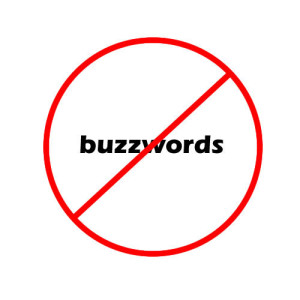Guest post by Amy Klimek, VP of Human Resources for ZipRecruiter
So you took some time and put together a half-decent resume. You’ve glossed over it time and time again, making sure you are represented well and removing any mistakes or typos. Even if you whittled it down to a single page, it still might have a lot of the bugs that live in most resumes that make potential bosses fall over in boredom. Buzzwords. 
Vicky Oliver, author of the book Power Sales Words, had this to say: “Stringing together sentences of meaningless words isn’t fooling anyone, even if they sound good. You need to get rid of them.” Buzzwords are your enemy and if you desire to stand out from the pack, you need to learn how to locate and remove them from your resume. Here is a list of five buzzwords you can remove right now to give yourself the advantage.
1) Meaningless Words. They are just so…meaningless. Some words are just so incredibly overused that they no longer have any meaning. There is no use getting cutesy and over thinking the message you are trying to send about why a company should hire you. Words like monetize, optimize, disrupt, utilize. Brandon Metcalf, Chief Operating Officer of Talent Rover, stated, “Use clear, simple language and tell people what you actually did, using task descriptions, examples and, most important, results.” Simple and straight to the point.
2) Superlatives. They exist all over the business world. Perhaps you’ve heard them in advertisements or used to describe a business, but terms like ‘cutting-edge’, ‘world-class’, ‘foremost leader’ should never be used in a resume. As with the above point, stick to the point. You won’t need puffery if you were a top-earner or led a national campaign. Just give potential employers something they can hold on to, a bit of substance that will weigh heavier in their decision than puffy terms that are meaningless. Tell them what you did that made you so successful in your previous work.
3) Clichés. This is a big one. You may be a superstar who always gives 110%, but really, those are the kinds of clichés you want to avoid on your resume. It’s lazy writing and tells your potential employees you lack original thought. The same goes with exaggerations and over-elaborations. Put yourself in the shoes of the employers. Is what you’re saying going to make them roll their eyes? Does anyone ever give a full 100%? If you’re making these ‘claims’, what else are you not being completely honest about that you need to over-extend yourself? Read over every word you’ve written and if any of them sound tired and clichés, cut them out.
4) Acronyms. There are some acronyms that are specific to the industry you’re going into and they can be helpful for future employers to know that you understand the business. But sharing that you are a Ph.D. in GL leading a board of BSN and DMAT selected to IMPA-HR, well, you just might be setting yourself up for disaster. It is more helpful to spell out what you’re meaning the first time you use it. Typically, your resume won’t land on the desk of the top guy without first going through the hands of a recruiter. The recruiter won’t be a professional in the industry, but rather someone with general knowledge who may not know what the acronyms mean.
5) Nonsensical. The using of nonsensical words goes along with point number one. They are meaningless words, like ‘liaisoned’. They may have a certain ring when added to your resume, but they aren’t even actual words. If you can’t find them in the dictionary, then you shouldn’t use them. They will not impress anyone.
Using these five tips, give your resume another glance and watch all the words and phrases that you might’ve used when describing yourself or your work. Remember, employers only hire general recruiters who generally don’t take the time to carefully study every detail. They care about the important facts that give them a positive first impression.


Do you think that clichés are for real a big mistake?